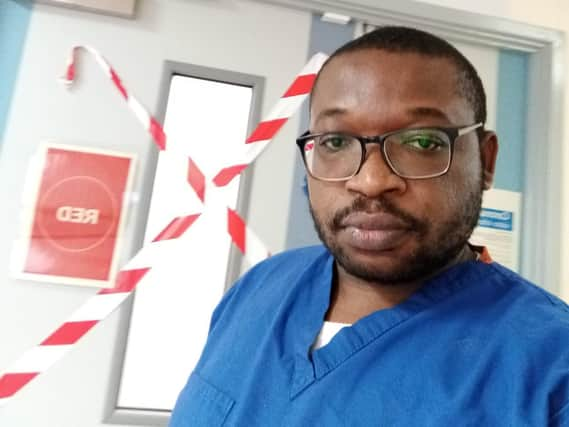Inside story of the everyday heroes on Preston's coronavirus ward


Much has been written about NHS workers on the frontline in this novel coronavirus pandemic who are trying their best to deliver quality health care to their patients knowing they could succumb to the very illness they are trying to fight against.
The kindness and goodwill of British people to NHS staff and other frontline staff in this period (from almost daily deliveries, to inspiring cards and shop offers) cannot be overemphasized for which I am sure all of us are grateful for.
Advertisement
Hide AdAdvertisement
Hide AdAs an immigrant doctor, I remain very privileged to be working with some of the best brains we have to offer from all continents of the world. An impressive team of doctors, nurses, pharmacists, physiotherapist, health care assistants, estates staff and unit keepers etc. could not have been more efficient.
The exemplary nature of mutual respect exhibited to each other while encouraging the best from all is truly remarkable. Waking up most days and frequently having to work extra hours/shifts to ensure the work is done and optimum care provided; foregoing your normal leave entitlement; working during public holidays and/or weekends pushing to the give excellent care to our patients; is truly remarkable.
From getting to work and changing to your scrubs , to taking handover from the previous team, to moving to designated areas where your effort is really the best needed - which currently is the where critically ill Covid-19 patients are being treated.
The area where we engage in the day’s battle in our efforts to win the war despite the risk of being victims - the perfect illustration of the best of what human beings can offer. Our efforts to get to know our patients better by going through available records, previous medical interventions before going into the critical care area to spend time with them.
Advertisement
Hide AdAdvertisement
Hide AdProceeding to put on our personal protective outfits from gowns to mask to caps to goggles and face shields, then making sure we are adequately kitted and clear focused on broad plans for our patients before going into the unit to carry out the job of the day which is doing our best to ensure the patient gets the best care possible demonstrate our determination to make the world better.
In these potentially harmful rooms, the team makes effort to keep the patients stable aiming for set of values as close to our target as possible. Our efforts to ensure those who need to be given oxygen through other more sophisticated means get to have it. Those requiring the next big step of putting them to sleep and connecting them to a breathing machine also known as ventilator (which a number of them require) , we immediately go ahead to provide that as we try to give them a fighting chance to beat the virus.
The highly coordinated efforts of attempting to flip our patients to their stomach while all the equipment is still connected and our delicate movement of patients to areas best suited for performing more specific tasks.
Making decisions and setting up machines which help the functioning of other parts of the body affected by this disease like the kidney and the heart while at the same time fighting to ensure other parts of the body remain in good shape.
Advertisement
Hide AdAdvertisement
Hide AdAs required , we most times need to get a much more bigger and dependable access into the body through the very big veins close to the heart to help in administering highly active medications; a task not made easier by how uncomfortable it is to be so long in our protective gear.
We also strive to make sure appropriate medications are obtained at the appropriate amounts with members of this sophisticated team calculating the medication rates and ensuring they all go at the appropriate amount. Ensuring patients receive the necessary amount of oxygen, making sure the expected heart beat, breathing level and ventilator settings are maintained, recording what is given and what comes out of the patient - an example of the safety measures constantly employed to ensure the best possible care.
This is followed by the usually detailed sometimes intense phone discussions with individual patients’ next of kin in an effort to update them on events of the day as we are essentially their eyes and ears to their loved ones.
Our ability to communicate effectively with them with appropriate empathy while providing them with update on their loved ones condition knowing that they cannot visit themselves as a result of the infection control measures is truly inspiring.
Advertisement
Hide AdAdvertisement
Hide AdAt the end of the shift feeling an unimaginable level of exhaustion and going ahead to hand over to the next group for continued care and then heading to shower usually getting emotional because of the days experience.
When this is done, changing back to our outward clothes and heading back home to our loved ones knowing we are returning back soon to continue the war.
I know this is a tiny bit of what you guys pass through almost daily but this is to let you know the world will see it and appreciate what happens inside these very restricted rooms where we spend a sizeable chunk of our life in.
To the Arifs, Hassans, Sushs, Jeanines, Lauras, Sharons, Mings, Jacques, Bindus, Beckys,Simons, Emmas, Alisons, Marks, Reenas, Lisas, Alices, Marks, Toms, Mathews, Ikes, Rachels, Avis, Mohammeds, Lavas, Swaps, Sheleens, Johns, Andys, Chris, Sallys and others both in ICU in my trust at Preston and ones all over the country; you are truly great! Please, hang in there.